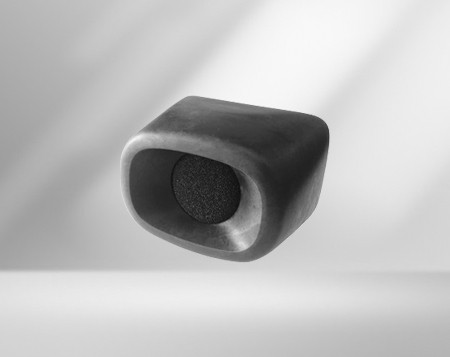source:Industry News release time:2021-09-11 Hits: Popular:Brand bar audio wholesale
Talk about the 4 elements of professional audio power amplifier and speaker matching
The greatest play. Let's take a look at it in detail below.
1. Power matching
In order to meet the requirements of high-fidelity listening, the rated power should be determined according to the best listening sound pressure. We all have this feeling: when the volume is small, the sound is weak, thin, unable to come out dynamically, dull, noticeably lacking in low frequency, poor fullness, and the sound seems to be shrunk inside and can't come out. When the volume is right, the sound is natural, clear, round, soft, full, powerful, and dynamic. However, when the volume is too high, the sound is blunt, not soft, rough, and has the feeling of rooting in the ears. Therefore, the playback sound pressure level has a greater relationship with the sound quality. It is stipulated that the sound pressure level of the listening area is preferably 80~85dB (A-weighted), which can be calculated from the distance from the listening area to the speaker and the characteristic sensitivity of the speaker The rated power of the speaker and the rated power of the amplifier.

2. Power reserve matching
Loudspeaker: In order to enable it to withstand the impact of strong bursts in the program signal without being damaged or distorted. Here is an empirical value for reference: the nominal rated power of the selected speaker should be three times the theoretically calculated power.
Power amplifier: Compared with a transistor power amplifier, a tube power amplifier requires a different power reserve. This is because the overload curve of the tube amplifier is relatively flat. For the peak of the over-loaded music signal, the tube power amplifier does not obviously produce clipping, but only rounds the tip of the peak. This is what we often call flexible shear peaks. After the transistor power is placed at the overload point, the non-linear distortion increases rapidly, causing serious clipping of the signal. It does not round the peak but cuts it neatly. Someone used a composite impedance composed of resistance, inductance, and capacitance to simulate speakers, and tested the actual output capabilities of several high-quality transistor power amplifiers. The results show that when the load has a phase shift, there is a nominal 100W power amplifier, and the actual output power is only 5W when the distortion is 1%! Therefore, the selection of the reserve amount of the transistor power amplifier:
High fidelity power amplifier: 10 times
High-end civil power amplifier: 6~7 times
Civil mid-range power amplifier: 3~4 times
The tube power amplifier can be much smaller than the above ratio.
How much margin should be left for the average sound pressure level and maximum sound pressure level of the system? It depends on the content of the program and the working environment. This redundancy is at least 10dB. For modern pop music, bungee music and other music, you need to leave 20~25dB redundancy, so that the audio system can work safely and stably.
Three, impedance matching
It refers to the rated output impedance of the audio power amplifier, which should be consistent with the rated impedance of the speaker. At this time, the power amplifier is in the best designed load line state, so the maximum undistorted power can be given. If the rated impedance of the speaker is greater than the rated output impedance of the power amplifier, the actual output power of the power amplifier will be less than the rated output power. If the rated impedance of the speaker is less than the rated output impedance of the power amplifier, the audio system can work, but the power amplifier is in danger of overload. The power amplifier is required to have complete overcurrent protection measures to solve it. The impedance matching requirements for the tube power amplifier are more stringent.
Fourth, the matching of damping coefficient
The damping coefficient KD is defined as: KD= rated output impedance of the power amplifier (equal to the rated impedance of the speaker)/power amplifier output internal resistance.
Popular recommendation
Bass Reflex Range Bar hall sound Vendor
2021-07-14Resolution 5S skeletal Concert sound Vendor
2021-07-16F55 Bar speaker company
2021-07-16Dance Stack Overview Car stereo Factory
2021-07-16A28 CARDIOID SUBWOOFER Learning audio Merchant
2021-07-26F215 MK2 ktv bar sound Factory
2021-07-14C15 Bar sound bar wholesale
2021-07-26C10 Sound bar manufacturer
2021-07-26DS15 Bar speakers Merchant
2021-07-14F10 Nightclub sound Vendor
2021-07-26I3PR Car stereo manufacture
2021-07-26Resolution 1.5 ktv bar sound Vendor
2021-07-16Mateng Audio, a professional audio equipment company for bars
2022-11-23The use and function of several major equipment in professional audio equipment
2022-03-19Hohhot ID-X CLUB bar sound engineering is provided by Ma Teng Audio
2022-02-14Conference room sound system solution.School audio sales
2022-04-27Simple classification of microphones in conference room audio equipment
2022-05-05Analysis of the cause of the failure of the speaker unit
2022-09-28Several cases of indoor places are not conducive to receiving wireless microphone signals.Campus out
2023-03-15Professional power amplifier - the role of power amplifier in audio.ktv home audio
2022-05-24Professional audio technicians teach you how to choose high-quality speaker equipment.Bar audio bran
2022-04-08The main points of daily maintenance of audio equipment equipment
2023-03-06Notes on the use of wireless microphones in conference room audio equipment.Bar hall sound price
2022-05-07Wuxi HYPER OG bar sound engineering is provided by Maarten Sound
2022-09-09